- Home
- Michael McBride
The Fall Page 4
The Fall Read online
Page 4
“All right, boys!” he whooped out the door. “We’ve got ourselves an escort!”
Kimball immediately recognized the model having served on one during the Gulf War. It was a Challenger 1 tank: seating for three with a 120 mm L11A5 gun, two 7.62 mm MG’s and two five-barrel smoke dischargers. Challengers had destroyed more than three hundred Iraqi tanks without suffering a single casualty of their own. They were the biggest and baddest land animals to ever slither across these deserts.
He clambered out of the seat, shielding his eyes from the dust with his left hand while flagging them with his helmet in his right.
“Yee-haw!”
* * *
“We’re out of time!” Adam shouted as he sprinted into the tent.
“We need five more minutes,” Thanh snapped nervously.
“Kimball’s orders. Grab everyone you can and move it!”
“We can’t leave any of these people behind.”
“I don’t intend to,” Adam said.
She looked quickly up to him from her patient while hooking him to a fresh tank of oxygen that she knew would only last for the next six hours if they were careful, forcing her to turn the flow from four liters to one and a half and hope he didn’t become hypoxic.
Adam smiled and gave her a squeeze on the shoulder as he passed to the adjacent cot.
“What do you want us to do then?” Keller asked.
“Just start grabbing people and getting them onto that truck. We can treat them in the back while we’re driving if we have to. So long as they’re on the truck.”
“That truck isn’t going anywhere until we’re all on board. I’ll see to that.”
“Kotter!” Adam shouted.
“Over here!”
Adam spun around to see the nurse kneeling next to one of the cots trying to pack the patient’s IV’s into a backpack.
“Get him on the truck! We can worry about the details later!”
“I’m not pulling his tubes!”
“I don’t care if you have to load him up holding those bags in his mouth! Just get him on the truck!”
Kotter struggled, wincing at the exertion, then heaved the man into the air, holding him across his chest with the man’s unconscious head lolling over his left shoulder, legs draped over his right forearm. Grunting, he pushed his way out of the tent and toward the truck, letting in a gust of sandy wind.
“I can’t carry this guy by myself!” Thanh yelled.
“Keller?”
“I’m on it,” Keller said, draping the woman he had across his chest over his right shoulder like a roll of carpet. He leaned precariously down to heft the slender man from the cot in front of Thanh.
“Come on!” Adam yelled, sliding his arms beneath the tattooed man’s shoulders and knees. “We’ve got to go now!”
Kotter breezed back into the tent.
“I’m guessing we have a few more minutes. Looks like we’re going to get a chaperone after al—”
A loud bang like boulders slamming together cut him off, followed by a high-pitched scream.
* * *
“It’s about time you guys got here!” Kimball shouted over the howling wind, battered from the side by the rising gale, still waving his helmet over his head. “I was beginning to think that we were going to have to—”
He slowly lowered the helmet to his side.
His face fell slack.
There was no combat dozer blade on the front of the tank. The external fuel tanks were mounted to the sides rather than in the rear. It was the same design as the Challenger 1, but a previous model.
It was a Shir2. Made by the British.
An Iranian tank.
“What’s wrong with this picture?” Kimball asked himself as he donned his helmet and slowly walked out to meet the tank.
They were barely thirty miles from the Iraqi border and smack dab in the middle of nowhere. Any armored convoy would have to have been sent out of Hamadan, which was close to a two hour drive in one of those tanks. They would have had to have been dispatched before Kimball had even been given the order to fall back.
He looked back over his shoulder at the truck.
There was a nine-millimeter in the glove box.
Fifteen feet away.
It would have made more sense to send an aerial escort. A chopper. Able to cover them from the air should things get nasty. Not a tank. A tank was too slow. They could have moved nearly twice that speed in the truck alone.
The only reason they wouldn’t have sent a chopper was if—
He stared down the turret as it leveled at the same height as his head.
—they didn’t want to show up on radar.
If they didn’t want anyone to know they were coming.
Kimball shook his head and looked to the sky.
There was a clap of thunder and a furious scream.
“Double crossing sons of—”
He saw the flare of muzzle fire, but didn’t even have the time to close his eyes.
The mortar impacted his skull with such force that it drove his facial bones back through his occipital bone, demolishing the entire works, cleaving his body from the ground. His left boot still sat erect on the sand while his body was launched like a twin missile beneath the spiraling shell.
The missile slammed into the front of the transport vehicle, lifting it from the ground and tossing it back over the line of tents in a swelling fireball of molten metal and smoke as black as death.
* * *
“Down!” Keller shouted, throwing the bodies from his shoulders to the ground and then covering them with his own like a human shield.
Flaming shrapnel tore through the tent as though it were made of tissue paper, immediately setting fire to the canvas shreds and everything else that got in its way.
Adam pinched his eyes shut, grinding his teeth, and dropped atop his patient.
A fiery wash of gasoline spattered the roof of the tent from the disemboweled truck as it careened over their heads with a grumble like an avalanche.
The flames consumed the canvas with such speed and ferocity that they had no way of even getting back to their feet before the fiery tatters dropped down upon them.
Adam smelled burning hair before he even felt the heat on his shoulders. A metal sliver stood from his shoulder like an angel’s broken wing, issuing a river of blood that sapped quickly into his clothing.
All he could think was to run.
He had no conscious control of his body as he hefted the man’s weight from the ground and raced away from the source of the explosion, leaping through what remained of the burning wall into the all-consuming smoke.
Retching convulsively, he stumbled, falling to his knees before summoning the strength to again stand and continue sprinting away from the intense heat he could feel against his back. Hair burned black up past his singed ears, smoldering in an attempt to rekindle itself against the tumultuous wind, he sprinted across the blowing sand until his legs finally gave out and sent him sprawling to the dirt. The tattooed man let out a bleat of pain when Adam crashed down onto him, driving his right knee through the man’s left fibula as though it was made of glass.
The man bucked back and released a scream that was drowned out by the wail of the second missile that pounded a crater into the earth where the tents had once been, throwing up enough sand to fill the sky around them.
Adam grabbed him by the back of the shirt and started crawling away, dragging the man behind him, choking on the sand and smoke.
Severed appendages and unidentifiable body parts littered the ground all around him between melting monitors and the mangled frames of cots, charred and blackened to the point that the flesh was split clear down to the charcoaled bone.
Adam collapsed, dragging the man atop his chest to try to scrabble backward on his elbows.
He thought of the little girl he had forced into her mother’s arms in the back of the truck, desperately trying not to gauge the size of the fiery arms attache
d to the clenched hands, the tattered straps of burning scalp and disembodied torsos, trying to determine if they had belonged to her. There was no point now, as he was sure whatever remained of her diminutive form could probably be scooped into a shoebox.
What kind of monsters would attack a refugee camp?
“She’s with God now,” the man whispered into his ear through pain-clenched teeth. Another missile screamed, obliterating the remainder of the metal frame of the truck. “They all are.”
Adam groaned as he tried to roll back over to all fours, feeling the sharpened tip of the metal lance grind against his scapular spine.
Cocking his head back to scream, a hand quickly slapped over his mouth, pinching it tightly shut again. His eyes raced skyward.
Keller crouched over him, half of his face charred to a ghastly black, though there was no determining the extent of the burn from that vantage. A wide white eye leered out from the blackness, scanning the horizon through the sand and dirt, waiting for the enemy to betray its location. In his left hand, he tightly gripped another hand, smaller, dainty, like the hand of a child in his meaty ham fist. Thanh lay face down in the sand behind him as though he had dragged her the entire way. Her formerly silken black hair tangled and knotted, singed in sections to curled black wisps.
“We need to find survivors,” Adam spat through the thick dust that coated his tongue and palate.
“No time,” Keller rasped, seizing Adam by the shirt collar.
Adam had barely enough time to wrap his arms and legs around the tattooed man before he felt the sudden jerk, the sand packing against his fried neck like the stingers of so many hornets.
He laced his fingers together, crossed his ankles and prayed the knots would hold as unconsciousness swelled like a wretched black tide.
V
Dover, Tennessee
THIS TIME OF YEAR, THE CUMBERLAND RIVER DIDN’T MEANDER AS IT DID IN the spring, winding slowly like any righteous southern thing down out of the Kentucky Bluegrass country and toward the country music capital of the world, but rather raced the migrating birds south for the winter. The dogwoods were no longer in bloom along the banks, having shed their flowers and leaves onto the speeding river to race away like their own funeral procession. All of the ’possums were already tucked away in the hollows of the trees and the last of the late summer’s over ripened fruit had leeched through the luxurious Tennessee grass and into the hardening turf.
Today was a late fall anomaly and Melissa Stringer intended to take full advantage of it.
Slipping off her Doc Martens and socks, she tiptoed across the dewy grass, a shade this side of frozen, and plopped down on the matted weeds beside her little section of the river.
“I know I’m going to regret this,” she said, biting her lower lip in preparation of thrusting her feet down into the river.
She shrieked with the cold, but forced her goosebumped legs to stay their ground, even as she watched her toes turn brighter than the last of the red maple leaves clinging to the branches for dear life.
The water raced past so quickly that the molecules felt sharp, as though somewhere further into the industrial north this same section of river had been frozen over and clogged with slush. Maybe it had. For all she knew, there could have been igloos and penguins north of the Mason-Dixon Line. The farthest she’d traveled from Dover had been to bury her grandparents in Boca Raton, though it was really like watching a TV show, since she hadn’t known her grandparents at all. They never approved of her mother Anne marrying her father Donnie. She’d been southern aristocracy, raised in an antebellum mansion that bordered the Savannah River just outside the town of the same name. While they hadn’t had servants per se, they had boarded a family in the servants’ quarters. A nice family of little means who kept up with the yard work and household chores while her father tended to his law practice and her mother kept up the society charade. To say they were stereotypical southerners would be to do them a great injustice. They were the forebears of the standard, the last remaining bastion of an era gone by, but sworn never to be forgotten in the General Lee-striped heart of Dixie. Her grandparents never forgave her mother, not even after she died of a cancer they knew to be breast, but surely would argue grew from shame. Maybe it was that Missy and her younger brother Mare represented some diseased limb of the family tree in need of pruning, some tainting of the pure Trafford blood, or maybe it was just that her grandparents were so self-involved that they wouldn’t have acknowledged their own grandkids unless they saw them looking back out at them through a mirror.
Missy preferred to think of it as the latter, though there were definitely more times than not lately where she wished she could wade into a pond filled with enough leeches to suck that Stringer blood right out of her.
Her father hadn’t been an Appalachian hillbilly: a five-toothed, gun-toting McCoy peddling the moonshine from his own still out of the back of a rusted wood-framed cart, but she thought her old man probably lived close enough to those fellas that they’d have heard him hollering long before that first echo. “You can take a boy out of the mountains,” he was apt to say, “but you can’t take the mountains out of the boy.” He’d used that motto to explain how he was often inclined to walk around barefoot or the thrill he got from knocking the gray squirrels out of the trees with his old slingshot. Later, he used it to explain his Jack Daniels breath or the loud crashing that awoke them in the middle of the night during one of his tantrums they’d inevitably have to clean up in the morning. A couple years prior, he’d driven them down a long dirt road, winding into woods so thick that she wondered how any bird could be small enough to fly through there, any rabbit thin enough to dash through the underbrush. It had been apparent that the ’possums still fancied the woods by the spatters of black blood and crusted fur on the channeled shoulders, though she never did see any of the bodies belonging to those smears. They’d passed a house that looked to have been made with wooden slats stolen from a collection of old fences, hammered together with nails long since rusted through and through. The roof had collapsed and the moss had already moved in and invited the vines to slither up the face of the shack. There were no windows, and no one had bothered to board up the holes either. The drive was so long since overrun by weeds that even the tire tracks were filling in.
“Must be dead,” her father had said with a shrug, turning back to the muddy road without slowing. That was the only time she had heard him utter a word about her paternal grandparents.
It wasn’t long after that sojourn that Staci, who dotted her “I” with a cute little heart, moved into her mother’s room and filled her bureau and drawers with her gaudy clothes and baubles, relegating her mother’s beautiful dresses, blouses, and skirts to boxes breeding dust in the moldy attic. They’d moved Mare into Missy’s room to make way for Staci’s girls, Amber and Ashley.
That had been three years ago now. Three of the longest years of her life. Three years of listening to Staci squeaking like a chipmunk while her father banged the headboard against the wall until the noise ceased, as it always did, with a groan not so different from the noise he would make while hunched over the toilet a few moments later. Three years of having to make breakfast for herself and her brother while her dad and Staci ate heavily salted toast soaked in Tabasco sauce to chase the green from around their gills at the kitchen table in their sweat-stained underwear. Amber and Ashley barely swallowed dry toast long enough to vomit it back up in time to squeeze into whatever cleavage-revealing, belly-ring-flaunting outfit that would undoubtedly be crumpled on the floor of a Mustang by third period. Three years of listening to her father’s drunk footsteps shuffling down the hallway in the middle of the night and pausing outside of her brother’s old room, standing there breathing heavily for a few minutes before lumbering back to his own room to bang on the adjacent wall some more.
She saw how he looked at them. Just a quick glance over the top of his glass, a sideways look from the couch. Missy imagined with thei
r bottle-blond hair, roller-applied makeup and shirts that would probably have been too small for her Raggedy Ann, that they must have looked an awful lot like their mother would have years before the sun leathered her skin and gravity claimed her breasts.
The sooner that she and Mare were out of there the better. They just didn’t know that when she went off to school down the Cumberland at Vanderbilt, that her sixteen-year-old brother would be moving along with her.
She knew her father loved them, and, eventually, when they ran out of cold beer in the fridge or clean plates in the cupboard, he’d miss them as well.
It was too bad her mother’s parents hadn’t been alive to see that the man they disowned their daughter for marrying had become just like them, cutting his children out of his life like a canker for the blood that he could no longer stand the thought of.
Feet finally numbing to the wiles of the river, Missy leaned her head back and let the unseasonably warm sun caress her face. In that moment it was summer. The scent of the sumac was thick as tar and the water tickling her toes slowed to a crawl. She stretched both arms out and let the warmth trace every inch of exposed flesh, shimmering on hair blacker than a raven’s feathers, trailing over her shoulder to the middle of her back. Finally, like a cat stretching on a windowsill, she arched her back and opened eyes bluer than the heart of the thickest glacier and clearer than a stream in spring. She felt the comfort of another hand settle over hers and smiled, finally turning to her left, expecting to find Mare sitting there beside her.
She looked at her hand, held by nothing.
“More man tears?” a voice asked from behind her.
She repeated it in a whisper.
Missy suddenly realized that the initial voice had come from someone else and jumped, jerking both hands back into her lap as though he had caught her doing something she shouldn’t have been. Her face paled quickly beyond its normal porcelain, highlighting the handful of freckles on her cheekbones.

 Blindspot
Blindspot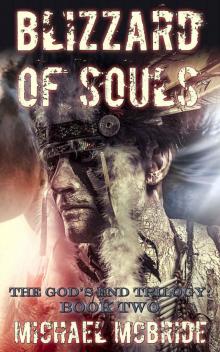 Blizzard of Souls
Blizzard of Souls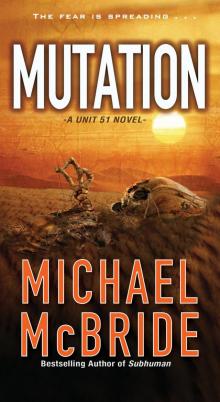 Mutation
Mutation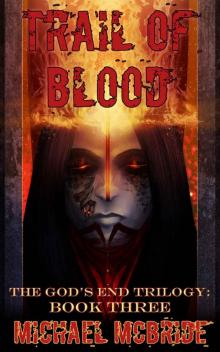 Trail of Blood
Trail of Blood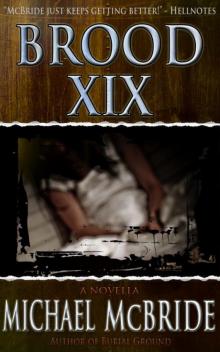 Brood XIX
Brood XIX The Fall
The Fall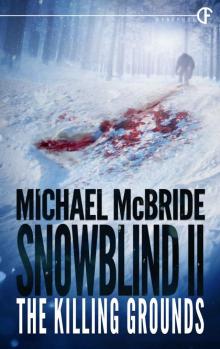 Snowblind II: The Killing Grounds
Snowblind II: The Killing Grounds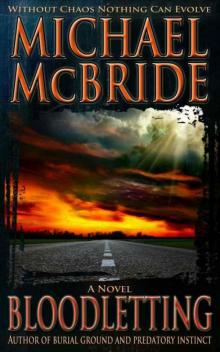 Bloodletting
Bloodletting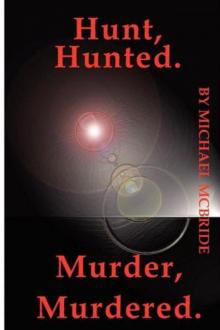 Hunt Hunted, Murder Murdered
Hunt Hunted, Murder Murdered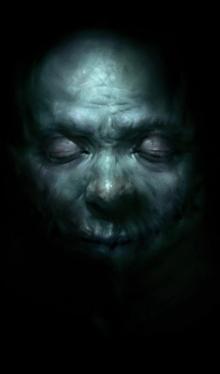 The Bloodspawn
The Bloodspawn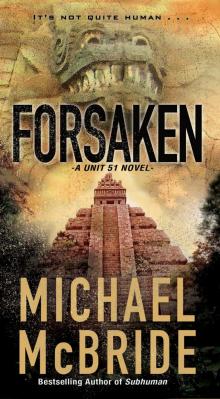 Forsaken
Forsaken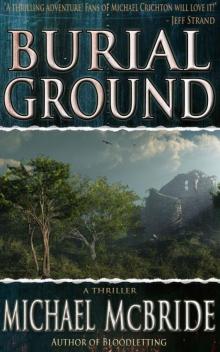 Burial Ground
Burial Ground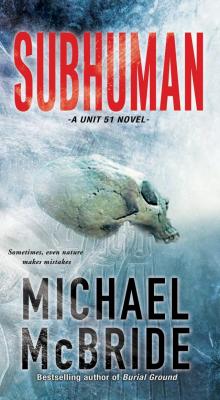 Subhuman
Subhuman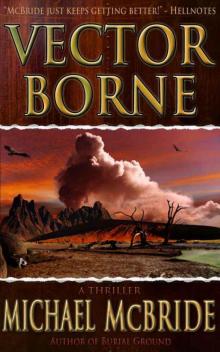 Vector Borne
Vector Borne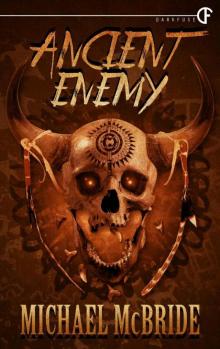 Ancient Enemy
Ancient Enemy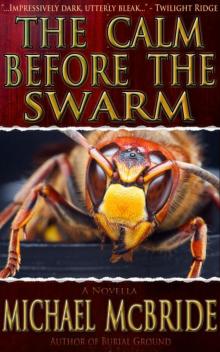 The Calm Before The Swarm
The Calm Before The Swarm Innocents Lost
Innocents Lost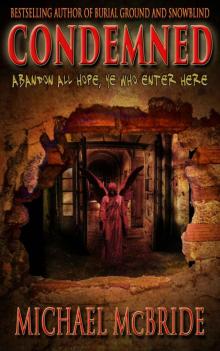 Condemned: A Thriller
Condemned: A Thriller